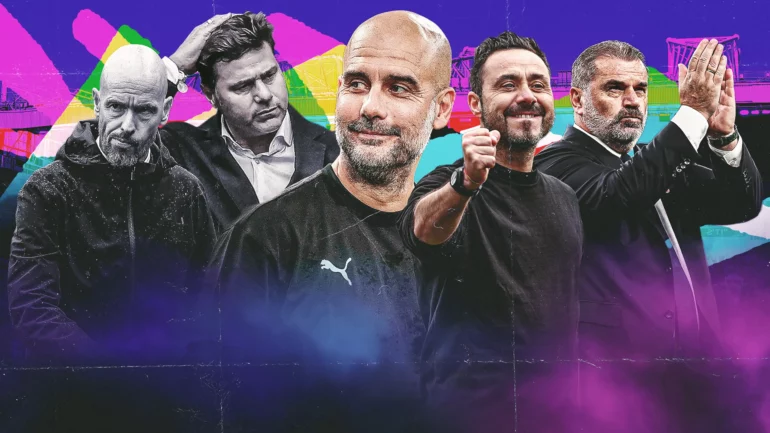Twelve weeks into the season, there have been zero managerial dismissals – have clubs begun to realize that changing managers is not a panacea?
All is calm, and it’s a little disconcerting. Last season, a record 14 Premier League managers left their jobs, but with a third of this campaign gone, we are still awaiting out first dismissal. It’s true that prime sacking season is not yet quite upon us and that the opening of the transfer window in January may focus minds but, still, this is a period of unusual stability. So what lies behind it?
Immediately there is a caveat, which is that Julen Lopetegui left Wolves shortly before the season began, reasoning that the financial constraints under which he would have had to operate were intolerable. The former Spain manager seemingly turned down the opportunity to take charge of the Saudi champions Al-Ittihad and now lurks as a potential replacement for any Premier League manager who is sacked this winter. Lopetegui’s successor, Gary O’Neil, has done a remarkable job given the restrictions on him: Wolves lie 12th in the table and probably would be in the top half had three poor penalty decisions not gone against them.
Last season, six managers had already gone by the November international break. Scott Parker had been sacked by Bournemouth after a 9-0 defeat to Liverpool and his seeming acceptance that relegation was inevitable (under O’Neil they ended up surviving relatively comfortably). Chelsea had sacked Thomas Tuchel after disagreements with Todd Boehly, the exact nature of which remain mysterious, and Graham Potter had left Brighton to replace him. Then Wolves moved on from Bruno Lage, Aston Villa from Steven Gerrard and Southampton from Ralph Hasenhüttl after disappointing starts to the season.
The first three of those, perhaps, can be regarded as slightly freakish occurrences, rooted in recent takeovers of Chelsea and Bournemouth. But it is telling that for three clubs patience had run out by this point last season, while none seem even close to acting this year. In part, perhaps, there is a reaction to the carnage of last season, a recognition that changing the manager is not a panacea. Leeds, Leicester and Southampton, the three relegated clubs, all changed manager twice.
But there is maybe also a sense that every club is (relatively) content with their lot and for those that aren’t, there are specific circumstances at play. Chelsea and Manchester United are clearly lower in the table than they would like or expect to be, but Mauricio Pochettino does appear slowly to be finding order amid the chaos of Chelsea. United, facing a group-stage exit from the Champions League, have, without playing especially well, won four of their last five league games, but Erik ten Hag is probably safe until Sir Jim Ratcliffe’s purchase of 25% of the club is complete. New ownership often means a change of manager; it would have made very little sense to go through the expense and upheaval of changing manager before the new investment.
Burnley are the other club who have obviously failed to live up to expectations. They were by far the best side in the Championship last season but lie bottom of the Premier League with just four points from 13 games. They, though, are invested in Vincent Kompany and, after the job he did last season, transforming their style, he probably still has credit in the bank.
The other two promoted clubs, Sheffield United and Luton, must have expected to struggle given budget and resources. It may be that in a few weeks one or other rolls the dice and sees what a fresh manager may be able to achieve but for now, Paul Heckingbottom and Rob Edwards are doing as well as could reasonably be expected; both, in fact, have seen a recent improvement in results (and Sheffield United have Bournemouth and Burnley to play in their next two games).
Bournemouth would have hoped for better but, having made the bold decision to replace O’Neil with Andoni Iraola in the summer, they are unlikely to be hasty. And Bournemouth too can legitimately claim that, other than the 3-0 defeat at Everton, they haven’t played especially badly this season, and that their league position is in part a result of a fixture calendar that leaves them with five teams in the bottom half still to play before the halfway point.
Everton are only second bottom because of their points deduction and have looked increasingly solid under Sean Dyche, while Steve Cooper remains popular with Nottingham Forest fans; eight points clear of the drop zone, anyway, is probably in line with expectations. Perhaps Marco Silva could come under pressure at Fulham, but the issue there is less the manager than a lack of investment, particularly after the departure of Aleksandar Mitrović.
Somebody will go, sooner or later, because football’s response to almost any crisis is to try changing the manager. But right now, it’s not obvious that anybody is in imminent danger – at least until Ratcliffe is installed at Old Trafford.
This is an extract from Soccer with Jonathan Wilson


